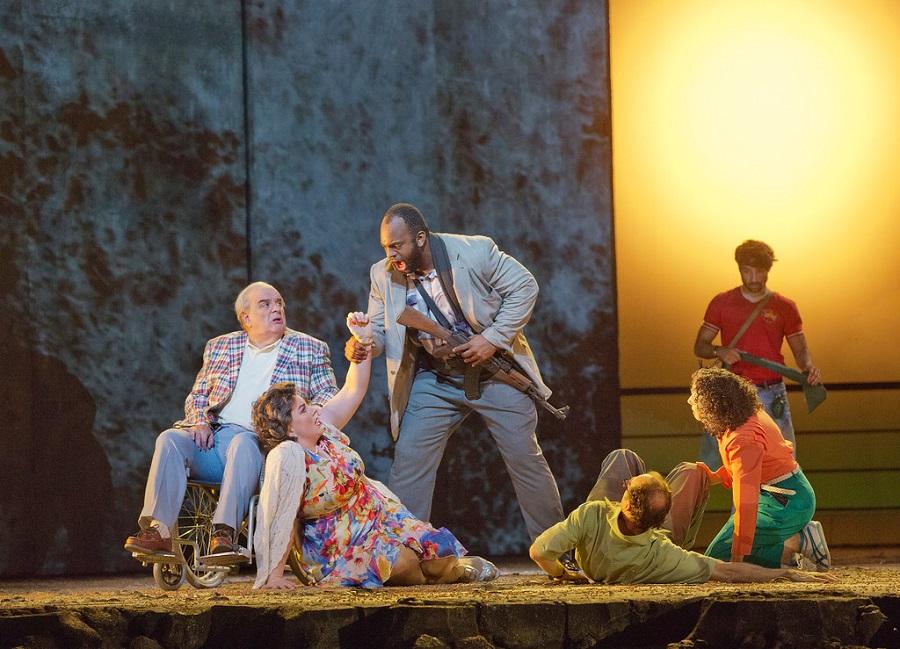Usually, the kinds of events in opera that spark controversy are when a tenor misses a high note and is booed off the stage or the soprano playing Salome is not wearing anything under her seven veils. It’s unusual to have protests and even more rare for politicians to weigh in.
““The Death of Klinghoffer,” the 1991 opera by the composer John Adams and the librettist Alice Goodman, has finally reached the Metropolitan Opera and the controversy has not ended.
Reportedly about 400 protesters gathered outside the opera house to protest the first performance on October 20th. Rudy Giuliani spoke and also wrote an article in The Daily Beast, in which he conceded that “[t]he Met has the First Amendment right to present this opera, and people certainly have a similar right to attend.” It’s reassuring to know that he has learned something about the Constitution since he tried to close down the Brooklyn Museum when he was mayor because he believed an exhibit was sacrilegious. Nevertheless, after noting that “John Adams is one of America’s greatest composers,” he said the opera distorted history.
I attended the opera on October 24th and didn’t see anyone protesting outside. In fact, at the end, the audience gave the cast and musicians a well-deserved standing ovation.
So, what did I think? First, let me lay my cards on the table. I am familiar with the work of Mr. Adams (including his operas “Doctor Atomic” and “Nixon in China”) and went with the expectation that the opera would not be bigoted. Nor did I believe that the Met would put on a piece that denigrates Jews or supports terrorism. I wasn’t disappointed.
The Met has been quite open about the opera. The entire libretto is reproduced on its website and the Playbill includes a statement by one of Klinghoffer’s daughters objecting to the work. I sympathize with her and am sure that her father was a wonderful man, but he is portrayed sympathetically in the work. Nor do I believe that the opera “romanticizes” the terrorists, another of her charges.
“The Death of Klinghoffer” begins with a Chorus of Exiled Palestinians, followed by a Chorus of Exiled Jews. The Palestinian women sing about their suffering and the men express anger at the “supplanters.” The Jews, in turn, also seek a homeland.
What Adams and Goodman are doing is setting the events in context. To pretend that the wrongs are solely by one side, as many of the protesters contend, is simply false.
The opera deals with the 1985 hijacking of the cruise ship Achille Lauro by members of the Palestine Liberation Front and their murder of Leon Klinghoffer, an elderly American Jew in a wheelchair (portrayed by Alan Opie). He and his wife were on a Mediterranean cruise to celebrate their 36th wedding anniversary.
Some of the survivors recount the events and then they are recreated, albeit with some poetic license. The projections on a screen provide information about the hijacking and there are photos of those involved.
Four terrorists take over the ship in Egypt when most of the passengers are on a tour of the pyramids. While the gunmen are shown committing brutal acts and expressing anti-Semitic sentiments, they are also occasionally presented in a lyrical vein, as when Mamoud (Aubrey Allicock) sings of the night and his love of music. Shakespeare and Verdi would have understood this depiction of the wrongdoers as being multi-dimensional characters rather than stereotypes.
Leon Klinghoffer is presented as a decent man, who, as he angrily tells the hijackers, is the type of person they like to kill. His wife, Marilyn (Michaela Martens), is also depicted sympathetically. She worries about her husband and does not find out until later that he has been killed and his body thrown overboard.
Marilyn had been led to believe that Leon was taken to the infirmary to be cared for. After she learns the truth, she sings movingly about her pain and rebukes the Captain for “embracing” the terrorists. Actually, the conflicted man (a difficult role, splendidly played by Paolo Szot) had been trying to defuse the situation.
The cast is uniformly excellent, with everyone singing with the appropriate emotions and even looking credible in the roles (which is often not the case with operas). Much credit goes to the director Tom Morris (co-director of “War Horse” on Broadway), conductor David Robertson and video designer Finn Ross (whose work is currently on Broadway in “The Curious Incident of the Dog in the Night-Time”).
Adams and Goodman should be honored for taking a troubling and timely subject and creating a thoughtful and musically fascinating work. As far as historical accuracy, it is closer to the actual events than Verdi’s “Masked Ball” (about the assassination of a Swedish king) or Giordano’s “Andrea Chenier” (about the poet executed during the French Revolution).
“The Death of Klinghoffer” is running through Nov. 15 at the Metropolitan Opera House, Lincoln Center; 212-362-6000, metopera.org. See it and make up your own mind.








